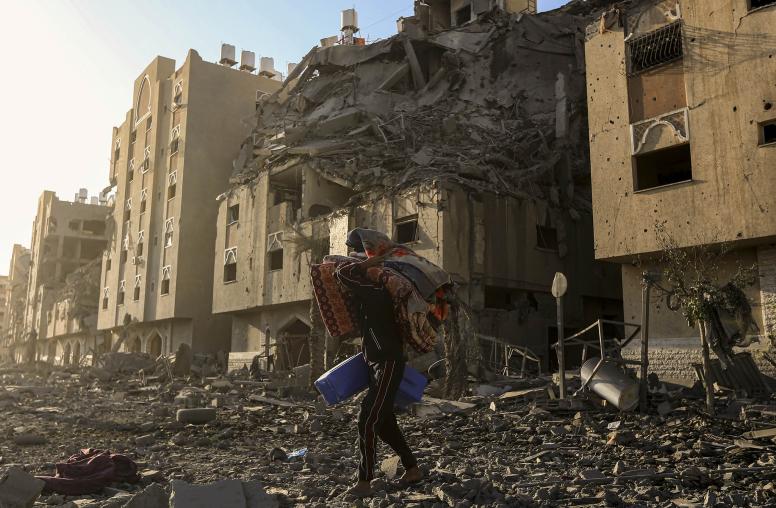Getting Past the Palestinian Bid for U.N. Membership
USIP convened a group of distinguished experts to discuss the way ahead after the Palestinian Authority moved forward with its application for U.N. membership. Progress has been made in recent years in Palestinian state-building, but how or if the two sides approach the negotiating table now remains far from clear.
MOVING HEAVEN AND EARTH – Achieving peace in the Middle East will require, in the words of USIP’s David Sanger, a "simultaneous eclipse of the moon and Mars." Sanger, who recently joined USIP’s writer-in-residence program, joked that the domestic politics of the Palestinian Authority, the U.S. and Israel all have to be ripe for a settlement to move forward.
"We’ll have a window of about five hours," he quipped during a panel discussion at USIP Oct. 7 on the Palestinian bid for U.N. membership and what lies ahead for the process.
Sanger moderated a panel that included Elliott Abrams, former deputy national security advisor under George W. Bush, Ziad Asali, president and founder of the American Task Force on Palestine, Robert Wexler, a Democrat and former congressman from Florida who is now president of the S. Daniel Abraham Center for Middle East Peace, and USIP’s Neil Kritz, who also serves as an adviser in the office of the Middle East Quartet representative Tony Blair.
SHAKING IT UP – Palestinian Authority President Mahmoud Abbas was successful at grabbing attention for a stalled cause when he began pushing for U.N. membership in New York last month against U.S. wishes, said Wexler. “He did actually shake it up,” he said. Against American entreaties not to do so, Abbas applied for U.N. membership, a proposal now under consideration by the U.N.’s Committee on Admissions. But Abbas has said he will not negotiate with the Israelis until they agree to a complete settlement freeze and the so-called 1967 line as a basis for new talks. That has raised doubts in some panelists’ minds that the Palestinians are serious about a peace deal.
"If Abbas would just say yes and show up at the negotiating table… then I think he would have a reasonable opportunity to find out once and for all if Netanyahu puts down a map – or not," Wexler said.
Such a map would detail just exactly what Netanyahu has to offer.
ABRAMS: WHY IS ABBAS PURSUING MEMBERSHIP? – Abbas has little time left on his political clock because he has said he isn’t running again and may be looking to go out with a bang, said Abrams. "He has achieved nothing in his political leadership except for a Hamas election victory," Abrams said. "That’s not a great legacy, so maybe if you get something out of the U.N., that’s a better legacy.”
And amid a wave of demand for reform and elections across the Middle East from the Arab Spring, Abbas isn’t allowing elections to go forward, so this is simply an attempt by Abbas to "do some theater in New York” by pushing for U.N. membership, Abrams said. “I think it’s unfortunate because it does not do a thing to advance the building of the Palestinian state," Abrams said.
LINKING STATE BUILDING TO A “POLITICAL HORIZON” – Panelists agreed generally that much progress had been made in terms of Palestinian state-building, especially in the last couple of years. But all members of the panel agreed that cutting off security and state-building aid to the Palestinian Authority – now under consideration by the U.S. Congress – would be shortsighted. Regardless of what happens, it’s critical to continue building the Palestinian state, they agreed.
“We need to manage the politics as we move forward and to continue with the state building program,” Asali said.
But state-building for state-building sake doesn’t make sense unless it’s tied to an end-state, so to speak: Palestinian state building must be linked to a broader “political horizon of statehood,” said Kritz “Incremental but serious steps” must be taken for the effort to serve any purpose.
IF NO NEGOTIATION, THEN TALKS? – Abrams, convinced that the Palestinians are unlikely to sit down to peace talks, suggested that there may be an alternative to direct negotiation that would keep the two sides talking. Second- or third-tier negotiators could discuss other issues of common interest to the two sides, including water, criminal justice issues, the Jordanian border or even the Dead Sea. "Let’s have talks," he said. "Just to get into a pattern of regular Israeli-Palestinian discussions."
PAINFUL PROCESS, PAINFUL COMPROMISES – Agreeing that the U.S. will be the one to drive any peace settlement, some panelists expressed concern that it would be hard to make progress during the American election season and whether President Barack Obama would be willing to spend the political capital to that end.
Others think the time could be just about right. Obama, Netanyahu and Abbas are each in their own way a stronger position to make things happen in the Arab-Israeli context.
If Israel’s chief concern is security and the Palestinian Authority’s main issue is land, then the two sides will have to settle their differences over these two strategic must-haves. Compromise will be painful but necessary.
"There has to be efforts on both sides,” Asali said. “It is important to know that yes the ultimate compromise is not going to be pleasant for all people.”



